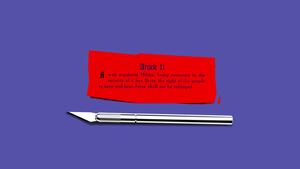In August 2021, after area schools had been closed for at least a year, the head of United Teachers Los Angeles, Cecily Myart-Cruz, infamously ruminated on the unique learning experience school closings had given L.A. students.
"There’s no such thing as learning loss," she told Los Angeles magazine. “It’s OK that our babies may not have learned all their times tables. They learned resilience. They learned survival. They learned critical-thinking skills. They know the difference between a riot and a protest. They know the words insurrection and coup."
Parents were also getting an education. Shortly thereafter, the LA United School District reported losing more than 27,000 students from enrollment numbers during the 2020-21 school year, exacerbating a slow decline over decades.
“The pace of the decline has accelerated since the pandemic, a phenomenon officials struggle to explain,” The Los Angeles Times reported at the time.
This is laughable. Allow me to explain.
Los Angeles and the country’s other major liberal urban and suburban areas, in alliance with teachers unions, perpetrated what The Atlantic recently called “the biggest disruption in the history of American education.”
Parents understood who was responsible. When major teachers unions and public schools acted like public education was nonessential, many parents took them at their word and found education elsewhere.
A 2021 Census Bureau survey showed homeschooling numbers jumped from 3 percent of U.S. students in spring of 2020 to a whopping 11 percent in 2021, with gains across all ethnic groups. Black parents, in particular, chose homeschooling more often—with the proportion of homeschoolers in that demographic increasing fivefold.
Many parents who were able to find (and afford) a spot for their kids in the private schools that stayed open during the pandemic did just that. (There’s something about the certainty of a five-day school week that parents and students have come to expect.)
More than 60 percent of private schools were open for in-person instruction by fall of 2020, whereas only 24 percent of public schools were, according to an Education Next survey from winter of 2020. National associations of Catholic and independent schools reported enrollment booms in 2022.
No national emergency has ever had such a profound and extended impact on American kids’ educations—not the Great Depression, world wars or 9/11. It’s hard to find anything close to a comparable disruption, but a Brookings Institution study found learning loss from pandemic closures was far worse than that caused by Hurricane Katrina for New Orleans students.
School leaders who allowed for extended shutdowns are now trying to paper over their failures with billions in funding from the Biden administration, paired with promises of tutoring solutions and mental-health support. But when it comes to losing students and trust, they are reaping what they sowed. Many parents learned for the first time in 2020 just what it looks like to be trapped in a failing public school. They also learned some leaders they thought were prioritizing their kids’ educations were not.
Enter school choice, a policy issue also reaping what the unions sowed during COVID-19. Long the bogeyman of teachers unions, school-choice programs allow parents to use some of the taxpayer money they are paying for public school to pay for educational alternatives instead, whether they’re parochial schools, private STEM academies, or classical homeschool curricula.
An Arizona law signed by Republican Gov. Doug Ducey in July is the most expansive in the country, allowing every student eligible for public school up to $6,500 for private-school tuition, online curriculums or tutors. This law, which is likely to serve as model legislation for other red states, plus a recent Supreme Court decision that smooths the way for school-choice money being used for religious (as well as secular) schools are poised to open new frontiers for the school-choice movement across the country.
The unions’ dire warnings against school choice rely on a handful of arguments and a well of trust they’ve worked overtime to undermine for two years.
The idea that Republicans want “weak public schools” or “complete destabilization” falls flat coming from American Federation of Teachers President Randi Weingarten, whose drive for year-long closures did more to weaken and destabilize public schools than anything in my lifetime.
The idea that Democrats and their teachers union allies are more trustworthy on education has taken a similar hit, as the Democratic Party has lost a 20-percentage-point lead on the issue in polling. It’s the first time in over a generation that Republicans are viewed more favorably on education. Indeed, the American Federation of Teachers found just that in its own polling of battleground states this week.
“The survey, conducted by Hart Research in seven battleground states in May and provided first to NBC News, found Republicans had a 39 percent to 38 percent advantage on which party voters trust more on education.”
Large numbers of respondents in these states (Arizona, Florida, Georgia, Michigan, Nevada, Pennsylvania, Wisconsin) also said schools spend too much time teaching about gender identity (43 percent), ranked “fundamental skills in reading, math, and science” as their top priority (58 percent), put teachers unions third behind teachers and parent groups in terms of trust, and perhaps most problematic for the Weingartens of the world, were more likely to blame Democrats than Republicans, by 5 percentage points, for politicizing education.
The poll amounts to a behind-the-scenes admission that unions and their allies in the Democratic Party have lost a lot of ground on this issue due to their own actions. A public admission would perhaps be most helpful to rebuilding trust, but don’t count on it.
Just this week, Gov. Gavin Newsom received a national award for his work in education. In his acceptance speech, he touted California schools’ $150+ billion budget. He didn’t mention that for all that money—more than $20,000 per student—California students got the fewest in-person days of schooling of any state in the union during the pandemic.
No wonder parents want to take their money and run.








